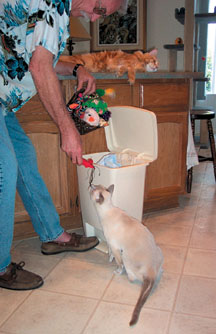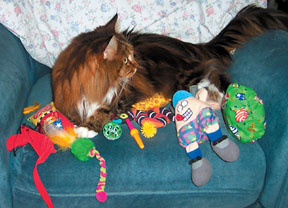Lets face it: Cats can be finicky. They may eat something one day and turn their noses up at it the next. They may enjoy playing with something for weeks, and then suddenly tire of it. No matter how hard we try to fathom their preferences, finding something that appeals to them on an ongoing basis can be difficult. In the meantime, weve accumulated toys our cats no longer want or food they no longer eat – and we may have no idea what to do with the items.
Food Thats Not a Feast
If your cat doesnt savor something youve bought him to eat, tires of the old standby, or needs to go on a special diet, dont waste the leftovers. Donating the unopened food to an organization or people who need help feeding the cats in their care may be a good solution. Donating food to shelters is the kindest thing to do, says Emily Levine, DVM, a resident at the animal behavior clinic at Cornell University, or giving to friends with cats or rescue organizations that need it.
Many shelters and rescue organizations are happy to accept fresh, unopened bags or cans of cat food. Some shelters, however, may accept only certain brands of food, so check with the shelter first before taking the food to them. If one shelter does not want the food, try local animal rescue organizations or even nursing homes that may have a resident cat. You can look in the Yellow Pages for shelters or nursing homes and call them directly, says Dr. Levine.

216
Another option is to find people who are feeding strays, such as at local colleges and universities, and offer to give them the food. To find the names of individuals or groups that care for feral cats, check the Alley Cat Allies Feral Friends Network or contact ACA directly (see resources at right).
If you want to donate to specific individuals who rescue or foster cats, ask the animal organizations for names of individuals who may want the food. If they do not know of any, you can check with area veterinarians or pet stores for referrals.
Another option is finding cat-owning families on low incomes or elderly cat owners on fixed incomes, says Dr. Levine. Human service agencies listed in your telephone directory may be able to put you in touch with needy families or individuals.
If the bag of food is opened, most shelters will not accept it, but a cat-owning friend who trusts you and knows the food is safe might want it. Before looking for a recipient, however, make certain the food is fresh and that the expiration date on the bag has not already passed. When in doubt about already opened food, the safest course of action is to throw it away.
Toys for Kitties
If your cat tires of his playthings, a shelter or animal organization may want them – provided they are clean and intact. Dont donate anything disgusting, says Dr. Levine. Its kind of like donating to Goodwill; toys should be in good condition.
Toys made of plastic, like tracks with balls that spin around them, intact wand toys, ping pong balls or other items that can be washed and disinfected are best. Toys with odors of cats that previously played with them may cause adverse behavior in cats that come in contact with them. Some cats may get very aroused and show signs of redirected aggression, and may urine-mark not just the toys but their area. Its safest if the shelter has a person on staff or a volunteer who can monitor the reaction of cats coming into contact with used toys.
Comfy Bedding and Furniture
Many shelters appreciate receiving clean bedding such as towels, sheets, blankets or kitty beds. Laundering bedding before donating it will help to deodorize and sanitize the items. Washing them as you would handle laundry should be fine as long as there are no diseased cats in your house, says Dr. Levine.

288
If your cat suffers from anything contagious – such as ringworm or respiratory illness – its best to throw away any unwanted items to prevent spread of the disease. If theres a contagious disease in the home, dont donate anything the animal has used, stresses Dr. Levine.
Donating Cat Furniture
If you have unwanted cat furniture – like climbing trees or scratching posts – contact shelters to see if theyll take it. Some shelters accept only new cat furniture because used furniture will carry odors, especially if the cat has urinated on it. (Or it may harbor parasites such as fleas.) Some shelters may accept used cat furniture as long as its undamaged and clean.
Plastic furniture can be cleaned easily, but carpeted cat furniture is more difficult to sanitize. If you have furniture to donate, clean it first with an enzyme cleaner to remove odors. If your cat has a contagious ailment, its best just to discard the furniture.
Shelters can always use baby gates that form circular playpens. Volunteers or staff who socialize the cats can put the cats inside the gates to play with them, says Dr. Levine.



